Farmer John Writes: Taylor Swift Took My Place
Harvest Week 6, Deliveries of July 25th – 29th, 2023
Friends,
Before I launch into the reason for the title of this story…
The Crops Here and in New England
Sweet corn is coming on next week.
Head lettuce will probably be back in abundance soon.
Carrots are here, sweet and earthy.
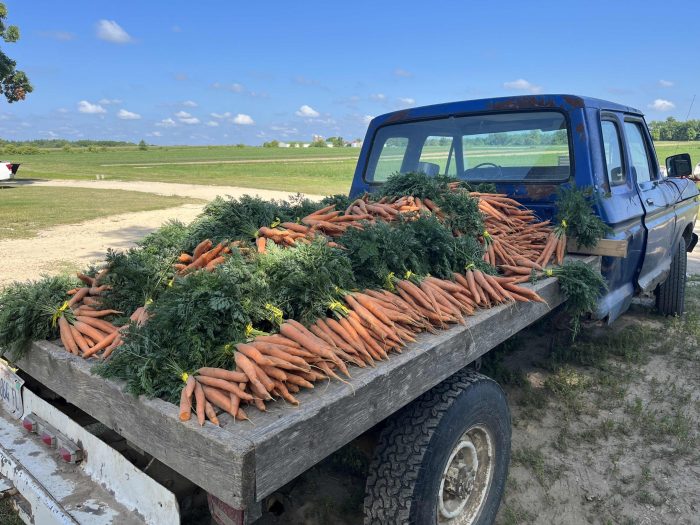
Occasionally, a carrot tip will get severed by our lifter, because the carrots are long and the lifter sometimes struggles to deeply penetrate the dry soil.
Click here for a short video of the tractor lifting carrots.
If you belong to a CSA in New England this year, you might be faced with the burden/opportunity/dilemma of sharing in your farm’s losses.
Crops, fields, whole farms have been obliterated by floods over there. Moderate versions of these things have happened on and off at Angelic Organics over the decades, never in severity, but enough so that shareholders got an experience of farm adversity.

Flooding in the Northeast. Will shareholders shoulder the burden?
Strangely, the way our CSA is structured in CSAware, there is a cash goal for the season of how much the shareholder is supposed to get—a $45 box for every delivery. I have pointed out to CSAware founder Guillermo that this hard quota violates the spirit of CSA. A share of the harvest is a share of the harvest, not a quantifiable amount of produce.
Fortunately, we have been growing enough produce during these past few years of working with CSAware that this allegiance on the part of shareholders has not been tested. Guillermo understands this—he is a great advocate of farmers. How to compensate for major losses, neither he nor I know.
I suppose some of the farms that CSAware serves in New England are being faced with this dilemma these days. Are the farms supposed to spend more money to make up for the boxes that can’t be filled?
The Weather
Day after day this season has provided mostly clear blue skies and moderate temperatures. Then, when we get pretty much caught up with the work, we turn on the irrigation and make it rain on the fields where we happen to want rain. It’s not quite an idyllic season, but it’s less raucous than most seasons.
Very little drama has transpired here due to rain or heat. Admittedly, a bit of drama has transpired here with the prospect of rain that did not materialize.
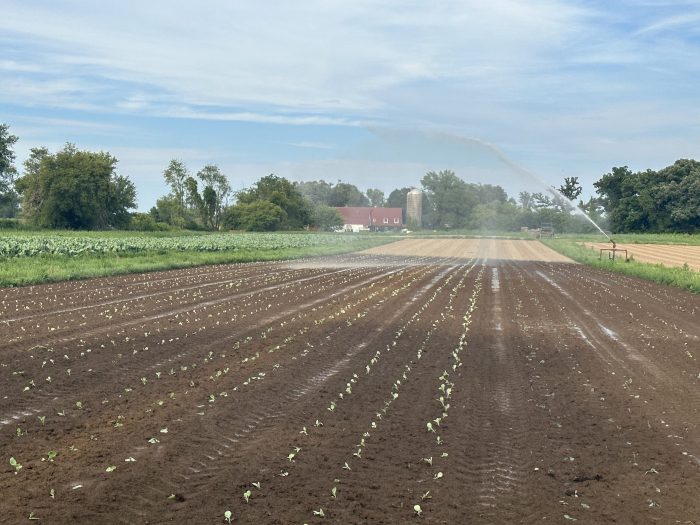
Rain Machine
Please Go Easy on the Office
Growing the crops is a manageable challenge. Delivering them is a manageable challenge. Customer service is a challenge that is hard to manage.
As previously noted, my wife Haidy has been managing customer service until we find a suitable new employee to take on this role, and until we have enough time to train in the new employee.
Haidy is already fulfilling many other administrative tasks on the farm, so customer service is a stretch for her.
In addition, she is soon leaving for a month’s stay in her home country of Finland, from where she will work remotely as needed. Please be judicious in contacting our office for customer support, as Haidy has other things to do in Finland than work full time for the farm.
Thanks to our FAQ’s, there are fewer emails that come in than in former years, but there are still a lot—a lot. Consult our FAQ’s. You might find you don’t even need to push that Send button for customer support.
Now About Taylor Swift
The utterance “Taylor Swift Took My Place,” spoken by my friend Lesley Littlefield Freeman, and her ensuing reflection are what caused me to write this story.
You might wonder if this story belongs in a farm newsletter, but farming is about everything, when you get right down to it, and therefore, I make a case that about anything I write about can be related back to farming. The story relates to choices we make; choices that we make by not making a choice; possible moments of destiny, fate, and will. It’s about excessive busyness and it’s especially about attitudes and opinions. I suppose all of these can be related to farming, to show business and to life in general.
Spring, 2006
In spring of 2006, Lesley and I were in Nashville to receive the Al Gore Award for best documentary film at the Nashville Documentary Film Festival for The Real Dirt on Farmer John.
As honorary recipients of the award, Al gave Lesley and me (along with some others on the film crew) a tour of the Gore home farm near Carthage, Tennessee.
I developed a mysterious affinity for Al Gore when he hosted us on his family farm. This affinity had a lot to do with his teenage history of growing up on the farm; he was in charge of the whole Gore farming operation during the summertime when his senator father Albert was in session in Washington D.C., being severely ostracized as the first senator to oppose the war in Vietnam. I felt a commonality, a karmic bond, between Al and me, having both experienced absent fathers during our early years—his father away in D.C., mine away in the afterlife.
My affinity for Al also had to do with his extraordinary oratorical gift, which reputedly did not reveal itself in his campaign for president. People said he sounded like a robot on the campaign trail, was stiff as a board.
However, close up, without the cameras rolling, I swooned over Al’s delivery. His words had wings—a Southern thing, maybe, or maybe a Gore ancestral thing.
On the tour, Al pointed out a very steep hillside that he had actually plowed with a mule. As he spoke, the mule and young Al materialized in my imagination, the mule straining against the plow, Al leaning into it. He described wrestling a drowning calf out of the Caney Fork River that wrapped around the farm, pushing the calf up the steep, slippery river bank. In my imagination, I heard the calf bellering and saw Al hoisting the struggling calf up the soggy edge of the river. I actually felt the cold, gooey mud caking onto Al’s teenaged skin. That’s how good Al was with words.
Years later, I would have a dream in which, in the hayloft of my barn, I told a therapist, “Al has a supreme gift of oratory. Spiritual forces enter into his words and glide with them from his lips out into the world.”
While Al walked us about the Gore spread of land, he seemed more and more like a personal fortress—distant, yet ironically charismatic and personable. Was he instinctively hiding from the decades of media invasion? Was he forever emerging from his legendary father’s shadow? What was he hiding, I wondered?
I had no interest in exposing Al to the world, in sensationalizing or glorifying him, like the media seemed driven to do. I suppose I wanted to hold Al up to himself, to expose him to himself. I wanted to find out what he was hiding, and why he was hiding it, and if he even knew he was hiding it. Al seemed to sense the danger that I posed—not the danger of public exposure, but the scarier danger of vulnerability. As I became more curious about him on the farm tour, he seemed to become more averse to me.
Balancing out his leeriness of me was his warm connection to Lesley, singer-songwriter, my lyrical, whimsical, creative partner during the days of the film. Lesley had a way of bringing mirth, mystery and wonder to her music, and to her life in general. I had helped her to produce a CD of songs and music videos before the release of The Real Dirt on Farmer John. Lesley seemed destined for fame, and I wanted to help her achieve it, not only for Lesley’s sake, but for the sake of the world. I had no connections in the world of music, but I thought that her appearance in the film, including her music video I Used to Bee, might launch her career.
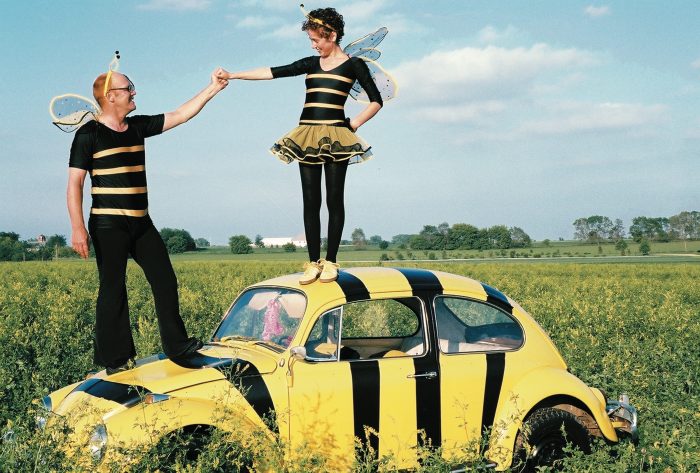
Lesley and me filming the “I Used to Bee” music video at Angelic Organics
I never tried to unearth Lesley; her enigma seemed sacred. On the other hand, Al’s enigma made me want to dig in, to explore, to reveal.
Al took a shine to Lesley—he just lit up around her.
The day after the farm tour, I met someone named Sarah in the hallway of my hotel. Before I finally found out that she was Sarah Gore, I was smitten with this person. I kept asking her who she was.
“Sarah,” she kept answering.
Eventually, Sarah observed, “oh, you are the guy in the movie that my daddy watches all the time and makes his friends watch.”
“Who is your daddy?” I asked.
Sarah kept mumbling and hemming and hawing and finally said, almost inaudibly, “Al Gore.”
Later, Sarah’s mom Tipper and Sarah came over to visit Lesley and me in Lesley’s hotel room. We hung out in a plume of fun and frivolity that seemed like forever, just lying around in silliness and unbridled affection. It felt like we were lifelong friends.
That evening in the hotel room, I strangely sensed that Tipper thought that Al needed me, needed me to reach him, unlock him, unfurl him. I wasn’t sure exactly what was needed, and I don’t think Tipper was sure either. It just seemed like I was supposed to help with it.
The next day, Tipper called and invited Lesley and me over to their home for dinner.
As we were arriving at the Gore home, I had a strong feeling that Tipper wanted me to be Al’s friend and that Al didn’t want to be my friend. I was too personal, too invasive. I had already said things on the Gore farm that Al didn’t want to hear, and I had already asked him questions that he didn’t want his wife to hear, and he certainly didn’t want his wife to hear his answers. (I am not referring to politics here, but to family history.) How did Al ever agree to this dinner? Since Lesley was also going to be at the dinner, maybe Lesley and I evened each other out.
Upon reaching the entrance of the Gore home, I was firmly entrenched in an opinion: Al doesn’t want me here.
I’m not keen on opinions. Opinions get in the way of the truth. I know that most people love their opinions, and many people think their opinions are truth. Maybe sometimes their opinions actually touch on truth, but generally, I don’t like opinions and I don’t like that I have them and I don’t like that I approached the Gore home with the opinion Al doesn’t want me here. It didn’t matter whether he wanted me there or not. What mattered was that I was rigorously and wrongly holding on to an opinion which shaped my experience of the visit, especially the first part of the visit. I wasn’t in possibility. I was in an opinion.
Al let us into the house. There was a man sitting in the living room who Lesley and I had never met.
Al said, “I’d like to introduce you to a neighbor who lives on my street.”
He then asked Lesley to take out her guitar and play some of her songs.
You might wonder why Lesley had her guitar. It was because she was scheduled to play at the legendary Bluebird Café that night.
This pre-dinner activity fit perfectly with my opinion that Al was going to do everything possible to fill the space that evening, so that I wouldn’t be invading him with personal questions and observations, wouldn’t be fulfilling Tipper’s hope that maybe Al and I would bond. Instead of Lesley, Al and me learning more about one another while Tipper prepared dinner, Lesley was supposed to conduct a songfest before her performance at the Bluebeard Café.
Lesley proceeded to play ethereal songs on her guitar accompanied by her ethereal voice. You can sample some of her music here.
I wanted this visitor gone. I was getting fidgety for us to have dinner with Al and Tipper, so I could presumptuously get to know unknowable Al better, and somehow help out Tipper.
The visitor finally handed Lesley his card and asked Lesley to get in touch and left. (Was he coming on to her, I wondered?)
Lesley, Tipper, Al and I finally had dinner, which really was a series of unmaskings that astounded all of us, not to Al’s liking— this was clear.
Please note: this story is not an exposé of Al’s secrets, and I am not talking classified government secrets. I am talking about personal things that would normally have been shared with a partner over the years. At most, it is an exposé of Al Gore’s vulnerability and his aversion to his vulnerability.
To be clear, I was not confrontive. I just provided an empathic space into which things could be shared, an opening. Maybe it was more of a vacuum. They were not dark secrets that were being revealed. Rather, they were rich, intimate secrets that should not have resided as secrets. Things just kept tumbling out of Al’s mouth, and Tipper’s jaw kept dropping.
Tipper kept saying things like, “Honey, you never told me that before” and “Honey, I didn’t know that about you and your father. That is so beautiful.” I think they had been married for 35 years by then.
Al seemed to despise the dinner. As I was talking, he jumped up to clear the table. While he was in the kitchen loading the dishwasher, Tipper said to Lesley and me, “he never clears the table.”
“Make him come back here,” I said. “Tell him I’m not done.”
“Honey, come back and sit down. John’s not done talking to you.”
Al returned to the table and sat down. I continued with my warm questions and interest which seemed very much to Tipper’s liking. She had not gotten Al to reveal certain secrets for 35 years, and I was bringing them to the surface. This didn’t bode well for their marriage, I told myself. (Four years later, their marriage ended in divorce.)
The dinner ended. It was late, so the Gores took us to the Bluebird Café to make sure that we arrived on time for Lesley’s scheduled performance. They ended up joining Lesley and me for the remainder of the evening. (I have written about this event at the Bluebird in a previous issue of Farm News, I Didn’t Sing That Night.)
When Tipper and Al got out of their car at our hotel to hug Lesley and me goodnight, Tipper exclaimed, “Al, I haven’t seen you so excited since you were a teenager. It’s like you’re floating on air.”
Lesley and I went on to tour Germany with her singing and my film, where the tour organizer virtually guaranteed he would make Lesley into a star. He really had no connections to the music world, though. Like me, he was just in love with Lesley’s music and wanted to propel her to stardom. He didn’t make Lesley into a star.
Winter, 2023
Fast forward 17 years to a weekend with Lesley, my wife Haidy, and me, while on holiday in California. It had been several years since we had seen Lesley, and it was exciting to be around her curious, exploratory, mirthful nature again.
“Bring your guitar,” I had implored Lesley as we were organizing the rendezvous. “Sing us some songs.”
“Nah. That was back when,” she answered.
We were having crepes at a restaurant called Enchanted Forest in Placerville, a little town northeast of Sacramento, when Lesley asked us, “Do you know about Taylor Swift?”
“I’ve heard of her,” I said. “I don’t know much about her.”
“Yes, I know about her,” Haidy added.
Lesley replied, “I know very little about pop culture. I had never heard of Taylor Swift until recently. I watched some of her music videos, and really liked them. Then I ended up on her Wikipedia page.”
“Taylor Swift took my place. Well, not exactly, but sort of…maybe. Remember that guy in Al Gore’s house, who Al wanted me to play music for?”
“Yeah,” I answered.
“When I was reading Taylor Swift’s Wikipedia page, his name came up. Robert Ellis Orrall. He’s a songwriter, music producer, all sorts of things.”
“I kind of remember that name—nice name.”
“He helped to discover Taylor Swift right after we met him. It could have been me instead. Well, not really, not for sure,” Lesley added, in her practical way. “Who knows? I just know he wanted me to follow up on our first meeting, and I didn’t.”
“Wow, a music producer was courting you at the perfect time in your life. That’s a dream. But yes, who knows?”
I followed up with a bit of research on Robert Ellis Orrall. From He Helped Discover Taylor Swift and founded Infinity Cat, I learned that Robert had “helped Taylor write and record a few songs and set up a show at the Bluebird Café…” He co-produced Taylor Swift’s multi-platinum self-titled album in 2006. That was the year that Lesley and I met Robert. “In just a few short years, nearly the whole world knew her name.”
I had had an enduring premonition that Lesley would be discovered, that her career would be launched by some blessed burst of synergy. Was this that cosmic moment that I ignored because I was on a mission to unveil Al Gore for Tipper? And for myself?
Was Al also trying to launch Lesley’s career? Did he, like me, sense her performance magnificence? Did he also know that the world needed her?
Maybe we had been invited to the Gores so that Robert Ellis Orrall could be discretely introduced to Lesley and her music. Maybe the stranger sitting in the Gore living room that evening was not a foil, providing a buffer between Al and me. Maybe he was the answer to launching Lesley’s deserved career, the answer, the breakthrough I had been seeking. And I impatiently dismissed this man, because I wanted to sit down for dinner and facilitate revelations at the Gore table.
I thought that Robert was in the way of what was supposed to happen that evening—Al Gore coming to terms with his wife and himself.
Even if my opinion was right, even if Al had an immense aversion to me, that should not have mattered. It should not have been in the way of what was possible for Lesley and the world that evening. Whether my opinion was right or not, Robert Ellis Orrall was on a tear discovering stars those days. He was in the Gore living room, listening attentively to Lesley.
Robert was not in the way of what was supposed to happen that evening. Robert was what was supposed to happen that evening.
What is going on in life all around us—what we know, what we think we know, what we think we know but don’t know at all, what we don’t even begin to know because we are so blind or opinionated? Imagine the mysteries, the possibilities, the opportunities to which we are oblivious—the hello not said, the seed not planted, the missed reunion, the unreturned phone call, the job not taken, the unwritten letter, the book not read, the trip not taken….
Reminiscences & Reveals
Lesley reminded me this winter that Robert Ellis Orrall sang for us Al Gore Lives on My Street that night in the Gore home. Here is a more public version of Robert’s performance of his song Al Gore Lives on My Street.
Lesley never sought fame. She welcomed it, if it were to happen, but she never sought it. I sought fame for Lesley, because I thought the world needed a boost from her lyrical loveliness.
Months after Nashville, before a screening of The Real Dirt at the Castro Theater in San Francisco that Al Gore was going to introduce, Al finally told me to stop being so personal with him. Did I deserve it? Maybe, but then again, maybe he needed someone to get personal with him. At least Tipper thought it put some spring into Al’s step the night of the Bluebird. I never saw Al again.
I loved Tipper. I never saw Tipper again.
Warmly,
Farmer John
-
[…] him. In addition, Farm News is seldom a definitive treatise on any topic (except perhaps the art of how to get bumped by Taylor Swift). I will therefore just impart some indications about Goethe. It does warrant saying, though, that […]
Leave a Comment
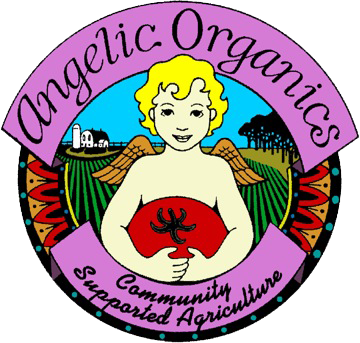
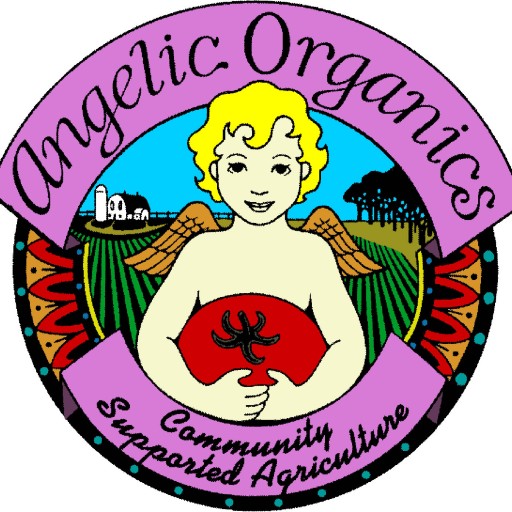
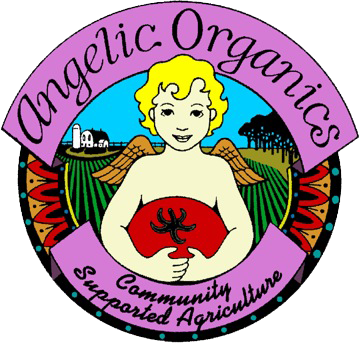

What happened to Lesley?
Lesley got waylaid by a romance that started the night of the Castro screening in San Francisco. She is still in San Francisco, a few romances later.
Wow!!!
I wowed, too, when I put it all together
In how many universes are how many possibilities/ probabilities, the mysteries within the mysteries … and all we can do is … the best we can…